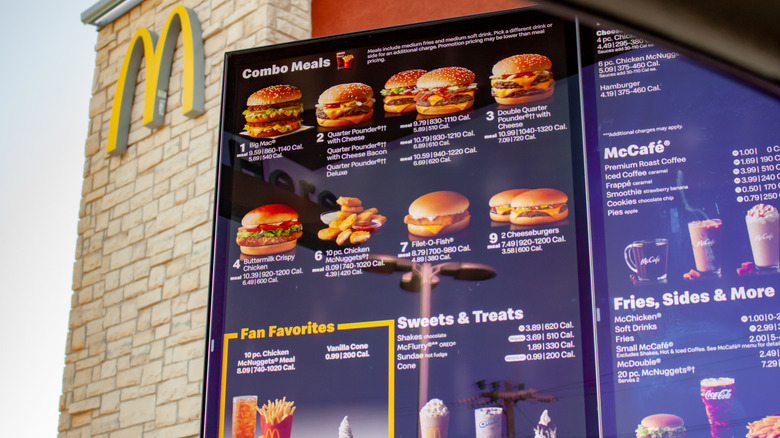Why Some People Are Calling For The End Of Calorie Counts On Menus
If you love dining out, you might occasionally feel frustrated, upset, or downright angry when you're looking down at a menu trying to decide what to order and are met with a dreaded figure: no, not the price of the item — which can be unsettling enough as it is — but its calorie content. While this often-startling information isn't usually found on the menus of local, independent restaurants, it most definitely is at chains: in the United States, as of 2018, any restaurant with more than 20 locations is required to list calorie counts next to each menu item it offers, according to the U.S. Food and Drug Administration (FDA). And so we've all undoubtedly been there over the past few years: hungry (or tipsy), zeroing in on some decadent-sounding menu options and feeling taken aback when we realize just how many calories we're signing up for in one sitting.
Although endorsed (and legislated) by the FDA, as well as local health commissioners, more and more people are calling for the end of calorie counts on menus — and not just unhappy diners, but also scientists and dieticians, who claim that while well-intentioned, required calorie counts don't seem to have had the intended effect of improving health outcomes (via Bon Appétit and Eater). And with similar legislation set to take effect in the U.K., a new wave of outcries against calorie counts has started up.
Calorie count laws haven't made an impact on the obesity epidemic
Dining out in the U.S. became a vastly different — and often more stressful — experience for some starting in 2008, when New York City was the first place to require any restaurant with more than 15 locations to post items' calorie counts on its menus, according to Eater. California followed suit the next year, and in 2010, the FDA required it of any chain with more than 20 locations (this rule was not implemented until 2018, as stated above). The impulse buy of a fried chicken sandwich with fries from Popeyes, for example, can take on more importance when you realize that the meal could contain more than 1,500 calories.
While seeing the calories you're about to consume might well inspire feelings of dread and guilt, those feelings don't necessarily translate to customers making healthier decisions when dining out. In 2015, for example, a study showed that since the introduction of New York's menu labeling law, "there were no statistically significant changes over time in levels of calories or other nutrients purchased or in the frequency of visits to fast food restaurants." Additionally, data from the Centers for Disease Control and Prevention shows that the U.S. obesity epidemic has worsened in recent years, with the number of American adults qualifying as obese reaching more than 40% for the first time ever in 2018, according to U.S. News & World Report.
The calorie count law comes to the U.K. in April
As reported by the Guardian, a version of these calorie information laws will take effect in the U.K. in April, with all restaurants with more than 250 employees required to post calorie counts on their menus. But given that these measures haven't shown any verifiable improvement on consumer health, businesses across the pond don't seem to think they'll have any impact on their customers — nor on their sales.
When the Guardian surveyed some of the U.K.'s largest restaurant and fast food chains, not a single one said it was planning on altering its menu to cut down on unhealthy items, or add healthier ones. The new law is "not a huge milestone for us because we've always tried to be transparent about our calorie information," a representative for Nando's, the popular flame-grilled chicken chain, told the outlet. The Guardian explains that Nando's (along with other chains like Wagamama and Pizza Express) already has the calorie information posted online, so this would not be a huge step to include it on the menu as well.
And what's more, some obesity experts say the counts aren't likely to change anything. "The reality is that we've had 14 policies over the last 20 years related to obesity, and it hasn't decreased, it's increased," Stuart Flint, psychology professor at Leeds University and director of Obesity UK, told the Guardian. "And the reason is that most of those are focused on individual changing. Obesity is very complex. If it was as simple as eating less or more, people wouldn't gain weight to the extent we have at the moment."


